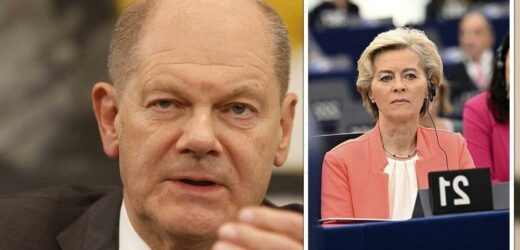Putin ‘playing chicken’ with gas supplies as Russian economy
We use your sign-up to provide content in ways you’ve consented to and to improve our understanding of you. This may include adverts from us and 3rd parties based on our understanding. You can unsubscribe at any time. More info
EU Commission President Ursula von der Leyen is facing a major facing headache, as her top commissioners from France and Italy expressed their fury over Germany’s plans to unveil a €200billion (£179billion) support package for its companies and households struggling with a huge surge in energy prices. This new fund referred to as a “defence shield” is aimed at lowering the cost of gas, as industries across Europe struggle to cope with the energy prices that have soared since Russia’s invasion of Ukraine. However, this major cash injection into Germany’s industries and consumers has sparked a major revolt from two of the most senior commissioners in the EU, Paolo Gentiloni from Italy and Thierry Breton from France.
As a result, Ms von der Leyen has been forced to distance herself from some of the leading officials, coming from the EU’s second-biggest and third-biggest economies.
While EU Commissioners are not strictly supposed to act as the emissaries of their home countries, Politico observes that the protests made by Mr Gentiloni and Mr Breton have perfectly mirrored the arguments made by Italy and France.
Both countries have slammed Berlin for its “Germany first” energy package, arguing that such a measure would hollow out the EU’s common market, putting German companies at an unfair advantage compared to the rest of the EU.
This has particularly sparked fury as many critics have accused Germany of triggering the energy crisis, by becoming heavily dependent on Russia for gas exports by building new pipelines.
In a series of Op-eds, the two commissioners urged solidarity across Europe, calling for “mutualized tools at the European level” — which could suggest a scheme for jointly guaranteed loans, like the one used to tackle the Covid-19 pandemic.
In a series of tweets, Mr Breton said: I have taken note of Germany’s €200billion plan to tackle energy-price surge — which we will carefully review. Two reactions on my part:
“1. Vigilance on the ‘level playing field’. I have been urging Member States to find all the means at their disposal to support their industries & businesses. But I believe this should be carried out with great #transparency, consultation and EU coherence
“2. What room for manoeuvre for the other Member States? While Germany can afford to borrow €200 bn on financial markets, some other EU Member States cannot.
“We need to reflect urgently on how to offer Member States — which do not have this fiscal room for manoeuvre —the possibility of supporting their industries & businesses.”
Following these statements, the EU Commission was forced to distance itself, with one spokesperson saying: “Op-eds are personal initiatives of the relevant commissioners,” adding that “they do not commit the Commission.”
Meanwhile, Sven Giegold, a state secretary at the Green-led German economy ministry, defended the package byu arguing that countries like France have introduced price caps.
DON’T MISS:
First ever nuclear fusion plant harnessing ‘endless power’ set for UK [REVEAL]
Jacob Rees-Mogg’s UK energy plans ‘worse than expensive heat pumps’ [INSIGHT]
Scientists’ warning as ocean to vanish as ‘supercontinent’ forms [REPORT]
He said: “We have not even defined how the famous €200billion package will be used. But, German industry keeps complaining to us that their offers are undercut by European competitors which are profiting from energy price caps.”
In an op-ed in the Irish Times, Mr Breton and Mr Gentiloni said: “It is more important than ever that we avoid fragmenting the internal market, setting up a race for subsidies and calling into question the principles of solidarity and unity that underpin our European project.
“Faced with the colossal challenges before us, there is only one possible response: that of a Europe of solidarity. In order to overcome the fault lines caused by the different margins of manoeuvre of national budgets, we must think about mutualised tools at the European level.
German Finance Minister Christian Lindner said he has defended his country’s plan adding “Our package is not disproportionate, in fact it is proportionate if you compare the size and vulnerability of the German economy.”
Source: Read Full Article







